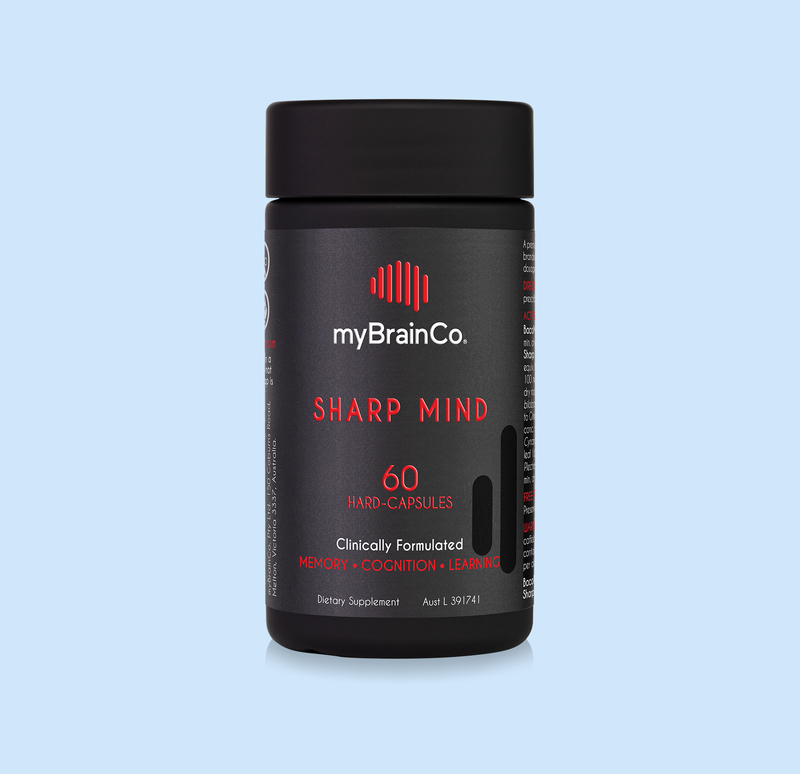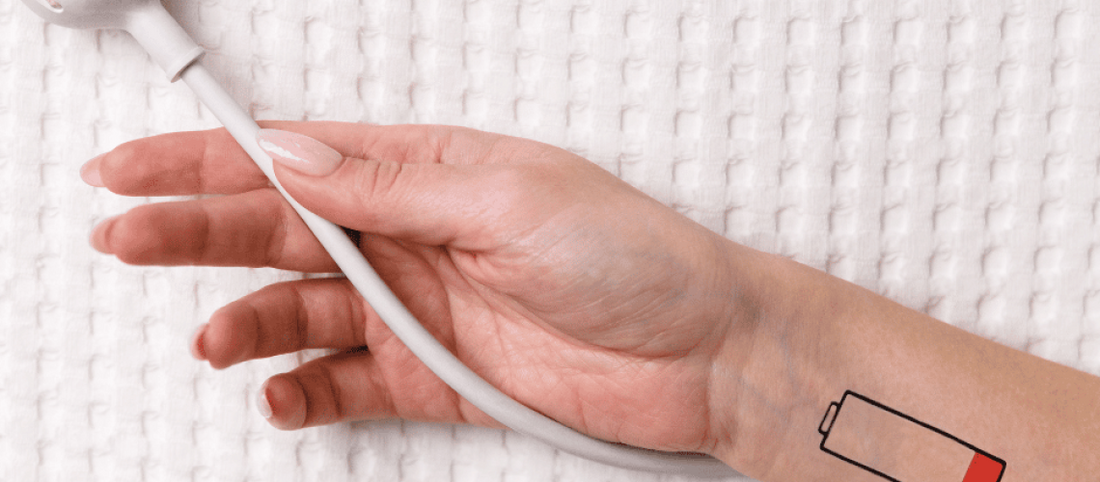Our brain and body depend on the production of energy called, ATP (adenosine triphosphate) to fuel our daily physical and mental demands. These units of energy are manufactured inside our cells by an internal ‘battery’ known as the mitochondria.
What are Mitochondria?

Mitochondria are the energy ‘factories’ of our body. The factories which exist in their trillions, rely on a constant supply of important nutrients (like B vitamins and coenzyme Q10) to maintain what’s known as the Krebs Cycle and Electron Transport Chain, in order to manufacture units of ATP.
Our ability to manufacture ATP relies on our dietary intake of nutrients to fuel the production process because it’s a molecule the body does not store.
Every cell has the equivalent energy potential of an AA battery. The human body generates around 1200 watts of power each day.
That’s enough power to run an average family home for a couple of hours!
When we lack important nutrients to drive the processes of cellular energy production, our mitochondria can become dysfunctional leading to increased risk of;
- Loss of energy production
- Fatty acid accumulation
- Excess reactive oxygen species (free radical) production
- Loss of cellular membrane integrity
- Poor glucose metabolism
- Poor cellular detoxification capabilities
- Neuroinflammation and brain fog
Mitochondrial dysfunction has been linked to many serious diseases including Alzheimer’s disease, dementia, chronic fatigue syndrome, Parkinson’s disease, diabetes, headaches, migraines, and early aging. Mitochondria can become damaged or dysfunctional as a result of nutrient deficiencies, exposure to environmental toxins, some drugs, and oxidative stress.
That’s why it is so important that our Mitochondria are healthy, and in sufficient numbers to ensure we continue to meet our daily energy needs, particularly as we age.
Mitochondria are Important to the Brain.
Our brains use around 20% of the body’s daily energy output to fuel around 100 billion hardworking neurons that make up the brain. Every neuron that fires, every thought, impulsive action, worry or decision we make, all require energy. Due to the brain’s metabolic demands, there is a strong link between mitochondrial dysfunction and neurodegeneration.
Now that we understand how important our mitochondria are to thinking and feeling our best, let’s look at those important nutrients that they need to function optimally.
The Essential Nutrients Driving Mitochondrial Energy Production
Activated B Vitamins – Essential for Energy
B vitamins are essential to turn the cogs of the energy production wheel (The Krebs Cycle). Riboflavin (vitamin B2) and niacin (vitamin B3) are important to making the FAD and NADH that help drive the Kreb’s Cycle.
When supplementing, choosing B vitamins that are in their activated form is ideal because they’re several steps along the biotransformation process and this allows our body to use them immediately without any additional demands on our metabolism.
Examples of activated B Vitamins include;
- Vitamin B2 – riboflavin sodium phosphate
- Vitamin B6 – pyridoxal-5-phosphate (P5P)
- Vitamin B9 (folate) – Levomefolate glucosamine (Quatrefolic®)
- Vitamin B12 – Methylcobalamin
Coenzyme Q10
CoenzymeQ10 is important for the second stage of energy metabolism, called the electron transport chain. The electron transport chain is a process that multiplies the units of ATP produced in the Krebs Cycle turbocharging production from 2 units of ATP to 32 units of ATP! If the electron transport chain is underpowered, you can see this would have a significant effect on energy production.
CoQ10 is a critical nutrient in this process as it donates electrons used to magnify our ATP and provides antioxidant protection against free radicals generated by the mitochondria during the energy production process. As we age, our ability to synthesize CoQ10 wanes, so supplementing with CoQ10 can help to ensure we protect our energy-producing cells and maximise energy output.
Carnitine – An Important Energy Shuttle
To make energy, we first need to transport fatty acids across our cell’s outer membrane to arrive at the mitochondria. This process cannot be achieved without L-carnitine!
Muscle cells are rich in mitochondria and carnitine is stored in skeletal muscle for ready access when needed for bursts of energy. Research shows that carnitine helps with the preservation of muscle mass, improved exercise tolerance and can support cognitive function.
Magnesium – Regulator of Energy Homeostasis
Magnesium deficiency affects about 60% of people and is an important co-factor in hundreds of enzymatic reactions including energy production. Magnesium is stored in mitochondria and is called upon to form ATP complexes. Without magnesium, ATP will not be in a biologically active form for the body to use for energy.
An imbalance or lack of magnesium has the potential to impair the ATP production process. Magnesium also functions as an antioxidant to protect the health of mitochondria.
The downside of energy metabolism
The sheer act of producing the energy needed to run our body also has a downside. The byproduct of energy production is free radicals. When free radicals are unopposed by antioxidant compounds to offset their damaging effects, it can cause cellular damage, including damage and dysfunction to mitochondria.
There are a number of antioxidants that can support this type of oxidative stress including glutathione, superoxide dismutase, N-acetyl-cysteine, resveratrol, creatine, magnesium, vitamin E and CoQ10.
The human body is an efficient piece of machinery but without access to regular amounts of the nutrients needed to run operations efficiently, it can become sluggish. Eating a balanced diet with a wide variety of fresh meats, fruit and vegetables, and topping up on targeted nutrients via supplementation, will go a long way to protecting our cellular function and the energy factories inside them to think and feel our best.
REFERENCES
- Pizzorno J. Mitochondria-Fundamental to Life and Health. Integr Med (Encinitas). 2014 Apr;13(2):8-15.
- Sawicka AK, et al. The bright and the dark sides of L-carnitine supplementation: a systematic review. J Int Soc Sports Nutr. 2020 Sep 21;17(1):49.
- Yamanaka R, et al. Mitochondrial Mg(2+) homeostasis decides cellular energy metabolism and vulnerability to stress. Sci Rep. 2016 Jul 26;6:30027.



